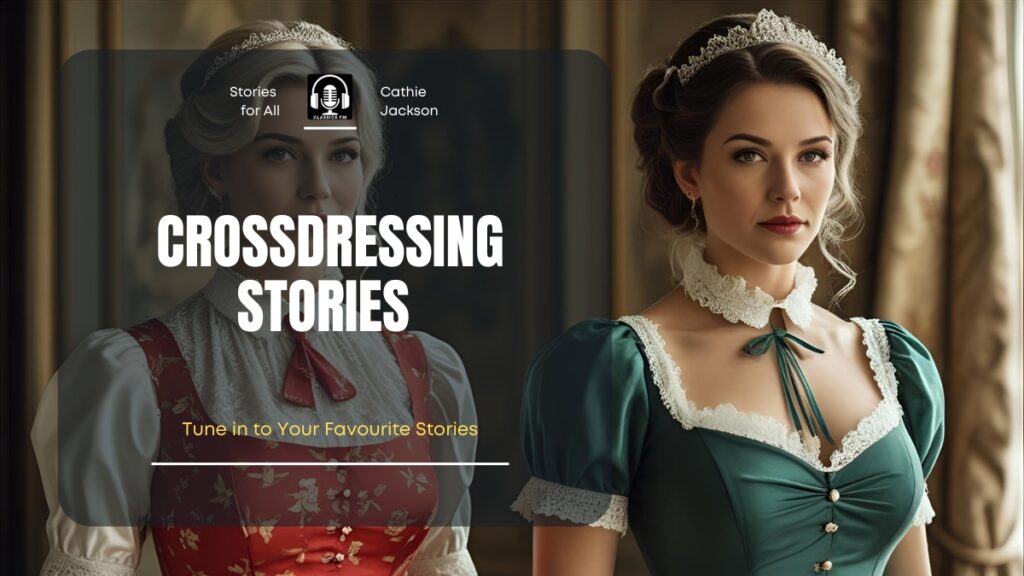I’ll admit it. I grew up terrified of shadows. Every squeak of a door. Every floorboard creak in the middle of the night. I’d yank my blanket up to my nose, convinced some ghostly figure was crouched in the corner. And you know what? I kind of loved it.
That’s the thing with spooky stories for kids. They scare you just enough to feel the thrill, but not so much that you run screaming out of the room. They’re like a rollercoaster you ride with your imagination instead of metal tracks. You’re in danger but safe, afraid but giggling.
And kids? They eat that stuff up. Always have. Always will.
But here’s the bigger question: why? What is it about these eerie little tales that sticks with us long after we grow out of cartoons and glow-in-the-dark stickers?
Let’s dig into it. Not just the “oh spooky stories are fun” part. But the messy, layered, deeply human reasons kids adore them — and honestly, why we need them.
Spooky Stories for Kids
Not all spooky stories are about monsters hiding under the bed. Sometimes, the spookiest ones are about creaky whispers in the attic, glowing eyes in the dark, or shadows that don’t belong.
These are the kinds of stories that give you a little shiver… but also make you want to hear just one more.
The Sleepwalking Cookie
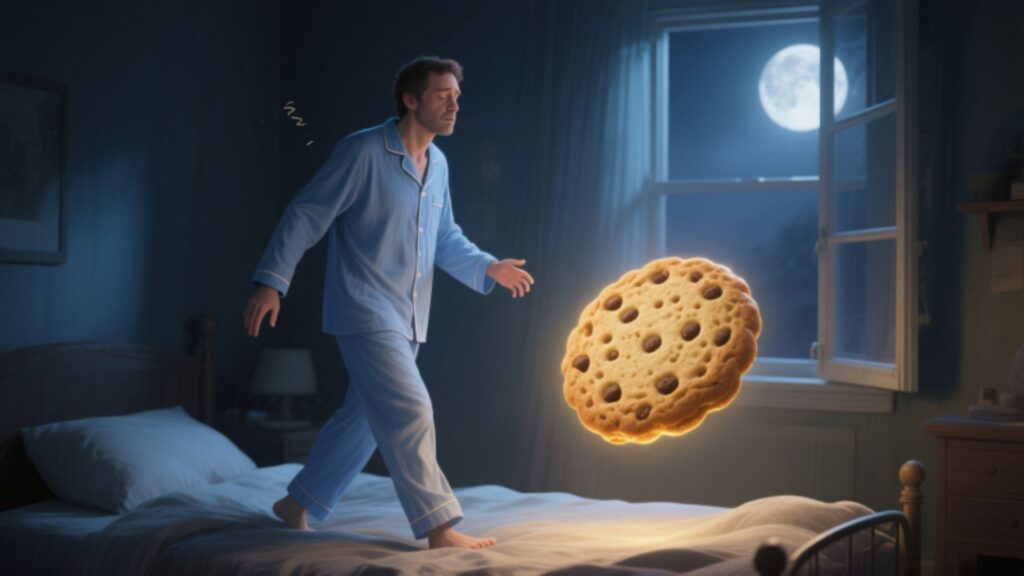
Liam loved cookies more than anything else in the world. Chocolate chip, peanut butter, sugar-dusted—he didn’t care. If it was round, sweet, and crunchy, he was in.
So when his mom baked a fresh batch one Saturday night, the whole house smelled like heaven. The warm scent floated up the stairs, past the squeaky banister, and into Liam’s room.
“Don’t eat too many before bed,” his mom warned, sliding the tray onto the counter.
“I’ll just take one,” Liam promised.
But he didn’t. He took three.
That night, Liam tucked himself into bed with a cookie still in his hand. Crumbs dotted his pillow, and he drifted off to sleep dreaming of chocolate chips.
At exactly midnight, something unusual happened.
The last cookie on the counter twitched. Then it shivered. Then—slowly, carefully—it stood up on its crumbs and tiptoed across the kitchen counter.
Liam woke to a sound. A faint pat-pat-pat on the stairs. Like tiny feet.
He sat up, rubbing his eyes. “Hello?”
Silence.
He told himself it was nothing. Just the old creaky house. But then—pat-pat-pat again. This time closer.
He turned on his bedside lamp, and that’s when he saw it.
A cookie. A cookie walking across his floor.
Liam froze.
The cookie froze too.
They stared at each other. The cookie’s chocolate chips looked suspiciously like eyes.
Then—pat-pat-pat—it bolted under his bed.
“Hey!” Liam whispered, dropping to the floor. He peeked under, but all he saw was shadow. And crumbs. A tiny trail of crumbs leading out of his room.
The next morning, Liam tried to explain.
“Mom! The cookie walked upstairs last night.”
His mom raised an eyebrow. “Too many cartoons before bed.”
“No, really! It had feet. And it ran under my bed.”
“Cookies don’t walk, Liam. They crumble.”
But when she opened the cookie jar, her face changed.
Empty. Every single cookie was gone.
That night, Liam set a trap.
He stacked pillows under his blanket to look like he was asleep. Then he hid in his closet with a flashlight, door cracked open just enough to peek out.
Minutes ticked by. His eyelids grew heavy. But then—pat-pat-pat.
Out of the darkness, three cookies marched into his room. Not just one. Three. Their chocolate-chip “eyes” glistened in the moonlight.
Liam nearly gasped, but he held his breath.
The cookies weren’t just walking. They were dancing. Twirling in a little circle on his carpet.
Liam couldn’t help it—he laughed.
The cookies stopped. Turned. Stared.
Then—pat-pat-pat—they charged straight at the closet.
“Ahh!” Liam burst out, flashlight on. The bright beam hit the cookies, and instantly—they froze. Stiff as statues.
Liam crept closer. They weren’t moving anymore. Just regular cookies.
Or so he thought.
He picked one up. Looked normal. Smelled delicious. His stomach growled.
Maybe just one bite, he thought.
Chomp.
Instantly, his lamp flickered. Shadows stretched across the walls.
And from under the bed—pat-pat-pat-pat-pat.
Dozens of tiny footsteps.
The whole army of cookies poured out. Sugar cookies, oatmeal raisin, even the broken halves from yesterday’s snack. All alive. All marching toward him.
Liam dropped the half-eaten cookie. “Okay, bad idea.”
He bolted out of his room, down the hall, and into the kitchen. The cookies chased after him, their little crumb-feet pattering like rain.
He grabbed the cookie jar from the counter. Empty. But maybe—just maybe—it was magical.
“Back inside!” he shouted, holding it out.
The cookies paused. They twitched. One by one, they began hopping into the jar. Plop. Plop. Plop. Until the last chocolate chip cookie gave him a glare and jumped in with a thunk.
Liam slammed the lid shut.
The house went quiet.
No footsteps. No whispers. Just the soft hum of the fridge.
Liam collapsed on the floor, breathing hard. “I am never eating cookies before bed again.”
The next morning, his mom found him asleep on the kitchen floor, arms wrapped around the cookie jar.
“Liam,” she sighed. “You’re obsessed.”
But when she reached for the jar, she frowned.
It rattled. Just a little.
As if something inside was still… pat-pat-pat… moving.
The End
The Whispering Treehouse
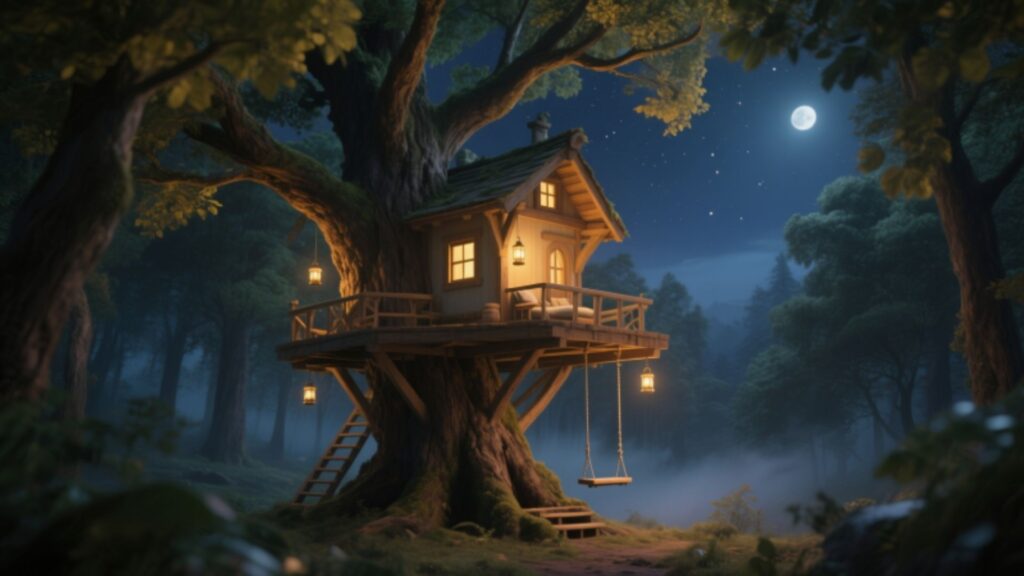
Ella and Max thought their treehouse was the best in the world.
It wasn’t very big. Just four wooden walls, a crooked roof, and a rope ladder that squeaked when you climbed it. But it was theirs.
Every afternoon after school, they’d scramble up the ladder, eat snacks, and tell secrets.
But only in the daytime.
At night, the treehouse was different.
It started on a breezy evening in October. The kind of night when the wind rattled the branches and the moon looked too close.
Ella was brushing her teeth when she heard it.
A faint sound. Almost like… a voice.
She froze. Leaned toward the window. The treehouse swayed gently in the backyard, shadows flickering across its crooked roof.
And then—clear as day—she heard it.
A whisper.
“Come up… come up…”
Ella’s toothbrush dropped into the sink. Her heart pounded.
She rushed to Max’s room. “Did you hear that?”
“Hear what?” Max was busy building a Lego tower.
“The treehouse. It… whispered.”
Max rolled his eyes. “Treehouses don’t whisper. They creak. That’s wood. You’re just being dramatic.”
But Ella wasn’t so sure.
The next night, she heard it again.
This time Max was with her. They stood side by side at the window, staring out at the moonlit treehouse.
The rope ladder swung, though there was no wind.
And then—soft, but clear—
“Come play… come play…”
Max’s Lego confidence disappeared. His mouth hung open. “O-okay. That… that was weird.”
The following afternoon, the two decided to investigate.
“Maybe it’s squirrels,” Max said.
“Or maybe…” Ella lowered her voice. “It’s haunted.”
They grabbed flashlights and climbed the rope ladder.
The treehouse smelled of pine and dust. The floorboards groaned under their sneakers.
Nothing unusual.
Until Ella spotted something carved into the wall.
Letters. Faint, jagged letters.
“STAY.”
Her flashlight shook. “Max… did you carve that?”
“No way,” he whispered.
Then they both froze.
Because right beneath the carving, fresh lines appeared. Scratching slowly across the wood, like invisible fingers etching a warning.
“STAY AWAY.”
They bolted down the ladder and didn’t stop running until they were back inside the house, doors locked, lights blazing.
“Okay,” Max gasped. “That’s it. No more treehouse.”
But of course, that night, the whispers grew louder.
“Come back… come back…”
“Don’t leave us… don’t leave…”
The voices were soft, overlapping, like many children whispering at once.
Ella pulled the blanket over her head. Max stuffed pillows against his ears.
But the voices kept slipping in. Gentle. Persistent.
“Stay with us…”
The next morning, they told their parents.
Mom laughed. “Oh, the wind does funny things.”
Dad shrugged. “It’s just creaky wood. Maybe the tree’s settling.”
But Ella knew better. Max did too.
“Settling trees don’t write words,” Max muttered.
That afternoon, they tried something new.
“If the treehouse wants to talk,” Ella said, “maybe we should listen.”
So they climbed up again, armed with a notebook and pencil.
The air inside felt heavy. Cooler than outside.
Ella whispered, “Who are you?”
Silence.
She scribbled the question in the notebook, placed it on the floor, and set the pencil on top.
Then they waited.
At first, nothing. Just the creak of branches.
Then—scratch, scratch.
The pencil moved.
Ella grabbed Max’s arm. “It’s writing!”
The letters were shaky, uneven. But when the pencil stopped, one word was clear:
“FRIENDS.”
Ella swallowed hard. “Friends?”
The pencil wobbled again.
“STAY.”
Max shook his head. “Nope. Nope nope nope.” He scrambled for the ladder. “Friends don’t scratch creepy words into wood.”
But Ella lingered. Something about the whispers didn’t feel scary anymore. Sad, maybe. Lonely.
“Who are you?” she asked again.
This time, the answer came fast.
“WE WERE KIDS. WE PLAYED HERE. WE NEVER LEFT.”
Ella’s breath caught. She glanced at Max, who had climbed halfway down the ladder.
“We never left?” she whispered.
“STAY WITH US.”
That night, neither of them slept.
Max wanted to board up the treehouse.
Ella wanted to understand it.
By morning, they agreed on one thing: they had to go back.
The treehouse was waiting. The rope ladder swayed gently, though the air was still.
Inside, the notebook lay open. More words scrawled across the page.
“COLD. ALONE. PLAY WITH US.”
Ella felt a lump in her throat. “They’re not scary. They’re just… stuck.”
Max crossed his arms. “Ghost kids? Stuck? That’s scary.”
But he didn’t leave.
The whispers grew, filling the treehouse. A dozen voices, soft as wind.
“Stay… stay… don’t go…”
The floor trembled. The walls shivered.
And then—just for a moment—Ella saw them.
Faint outlines. Shapes of children. Sitting in the corners. Huddled by the window. Eyes wide, glowing faintly, like fireflies.
“Please…” one of them whispered. “Don’t leave us alone again.”
Ella’s heart ached. She whispered back, “We can’t stay forever. But we’ll visit. We promise.”
The shapes tilted their heads. The whispers softened.
“Promise?”
Ella nodded. “Promise.”
From that night on, the treehouse was never silent.
When Ella and Max climbed up, the whispers hummed like a gentle chorus. The notebook filled with scribbles of tic-tac-toe games and jokes.
And though their friends couldn’t be seen in the daylight, Ella swore she felt them there—watching, waiting, grateful.
But sometimes, when the moon was full and the rope ladder swayed without wind, the voices turned urgent again.
“Don’t forget us… don’t stay away too long…”
And Ella and Max would glance at each other, shivering, and whisper back into the night—
“We won’t.”
The End
The Lantern with No Flame
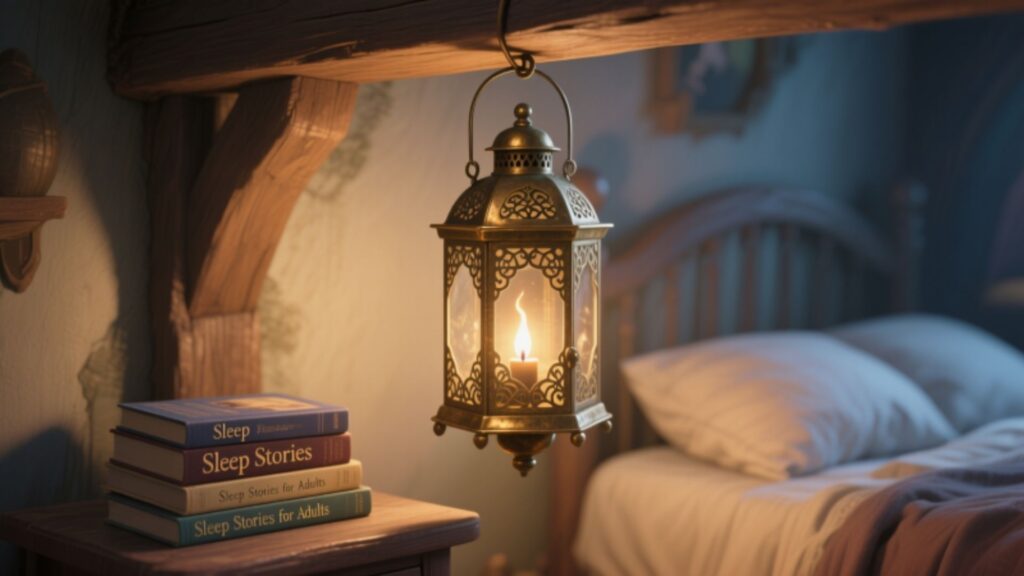
Sam hated the dark.
Not just disliked it—he hated it.
Every night, he begged to keep his nightlight on. Every night, he checked under the bed, behind the curtains, and inside the closet. Just in case.
“Nothing’s there,” his mom would say, kissing his forehead.
“Then why does it feel like something’s watching?” Sam whispered back.
One chilly evening, when the moon hid behind clouds, Sam spotted something strange.
At the window, glowing faintly, hung a lantern.
It wasn’t his. He didn’t own a lantern.
Yet there it was.
Floating just outside the glass.
He crept closer. The lantern was round and bronze, with little star shapes cut into the sides.
Golden light shimmered through the holes, flickering across his walls.
But there was no candle inside.
No flame at all.
Just light.
“Mom!” Sam called.
She rushed in, wiping her hands. “What’s wrong?”
He pointed. “The lantern!”
But when she looked—nothing. The window was empty.
“Too many spooky books before bed,” she sighed. She tucked him in tight and turned off the light.
But Sam stayed wide awake.
At midnight, the lantern returned.
This time, it wasn’t outside.
It was hovering above his desk.
Sam’s heart thudded. The lantern tilted slightly, as if… watching him.
Then it drifted toward the window. Slowly. Gliding.
Sam sat up. “Wait… do you want me to follow?”
He grabbed his slippers and crept downstairs, careful not to wake his parents.
Outside, the air was cold. The lantern bobbed gently in the darkness, like it was waiting.
Then it floated toward the woods.
Sam hesitated. He was scared of the woods. But something about the lantern felt… safe.
He followed.
The deeper he went, the brighter the lantern glowed. It lit the path, keeping the shadows away.
Finally, it stopped in a clearing.
And there—Sam gasped.
Dozens of lanterns hovered in the air. All glowing. All empty.
No flames. No candles. Just light.
“W-what are you?” Sam whispered.
The lantern nearest to him flickered. Then—like a projector on a wall—shapes appeared in its glow.
Children. Dozens of them. Running, laughing, holding lanterns.
The images shimmered in the light. Their faces were smiling—but faint. Almost see-through.
Sam’s chest tightened. “Are you… ghosts?”
The lantern pulsed. The glowing children nodded.
Sam swallowed. “Why are you here?”
The lantern nearest him tilted. The images changed.
This time, it showed the children walking into the woods with lanterns. Then—darkness.
The next images showed the lanterns glowing without candles. Just like now.
Sam shivered. “You… never came back?”
A whisper brushed past his ear.
“We’re still here.”
Sam spun around, but no one was there. Only the lanterns, glowing brighter, surrounding him like stars.
“We can’t leave,” the whisper said. “Not without a flame.”
Sam’s hands shook. “A flame? But you’re already glowing.”
The lanterns flickered. Dimmer. Fading.
“No,” the voice whispered. “Not this glow. A true flame. A memory.”
Sam didn’t understand—until he remembered.
His mom always told him stories about her childhood camping trips. How she and her cousins carried lanterns through the forest, singing to keep the dark away.
A memory.
“Wait,” Sam said, breathless. “Do you want me to remember for you?”
The lanterns glowed brighter, as if nodding.
So Sam closed his eyes. He pictured fireflies flickering in the trees. Kids laughing, running, holding lanterns high. He imagined warmth, friendship, light.
The lanterns pulsed. Stronger. Warmer.
When Sam opened his eyes, he saw them—clearer this time. The ghostly children, standing all around him, lanterns in hand.
They smiled at him.
And slowly, one by one, they faded into the night.
Only one lantern remained.
The first one. The one that had come to his window.
It drifted toward him, glowing softly.
“For you,” the whisper said.
Sam carried it home.
When his mom peeked into his room the next morning, she frowned. “Where’d you get that?”
“It was… a gift,” Sam said softly, tracing the little stars cut into its sides.
And for the first time ever, he didn’t need his nightlight.
Because the lantern glowed by itself.
But sometimes, late at night, when the moon hid and the dark felt too heavy, Sam swore he heard whispers drifting from the lantern.
“Thank you… don’t forget us…”
And the lantern’s light would flicker—like the laughter of children, still glowing, somewhere in the woods.
The End
The Cat Who Counted Stars
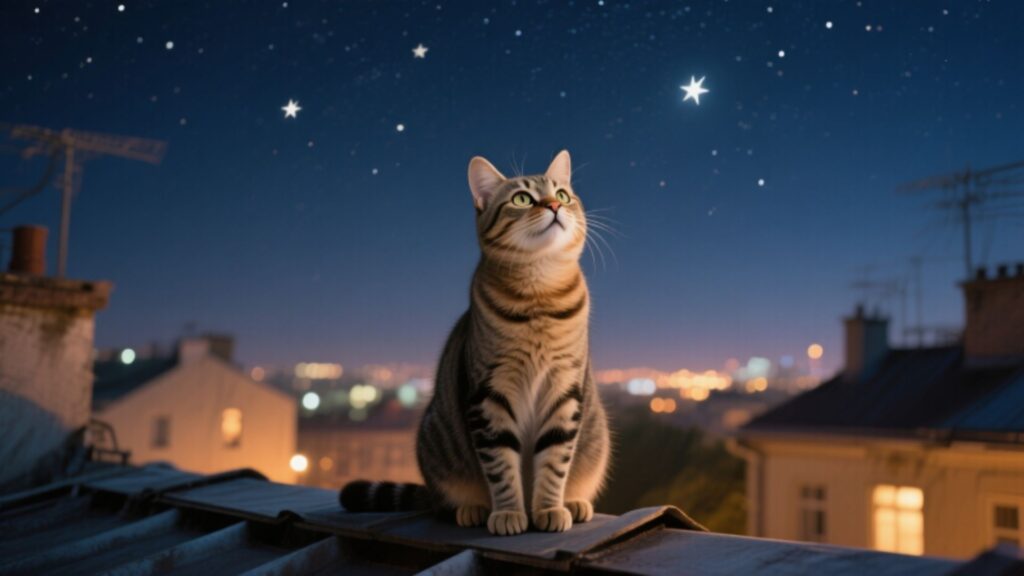
Maya had never owned a cat.
She liked them, sure, but her dad was allergic and her mom said pets were “too much trouble.”
So when a black cat showed up on their porch one evening, Maya thought she was imagining things.
But it wasn’t her imagination.
It was real.
The cat had the shiniest fur Maya had ever seen. Black as midnight, smooth as glass. Its eyes were pale yellow, glowing like lanterns.
And it sat perfectly still. Staring at the sky.
“One, two, three, four…”
Maya blinked. Had the cat just… spoken?
She leaned closer, pressing her face against the glass.
The cat’s mouth moved slowly, counting each star out loud.
“…thirty-two, thirty-three, thirty-four…”
Maya’s breath caught. “Mom! Dad! There’s a cat outside! It’s—”
But when she turned around, the living room was empty. Her parents had already gone to bed.
She looked back. The cat was still there. Counting.
“…fifty-one, fifty-two, fifty-three…”
It didn’t look at her. Didn’t move. Just stared at the sky, tail flicking back and forth.
Finally, at ninety-nine, it stopped. Its ears twitched.
And then—slowly—it turned its glowing eyes toward her.
Maya stumbled back from the window.
The cat tilted its head. Its mouth moved again.
But this time it wasn’t numbers.
“Almost there.”
The next morning, Maya rushed outside.
The porch was empty. No paw prints, no fur.
But that night, when the sky grew dark, the cat returned. Sitting in the exact same spot. Counting again.
“One, two, three, four…”
Maya whispered, “What are you counting for?”
The cat didn’t answer. It just kept going.
She began keeping track.
The first night: ninety-nine.
The second night: one hundred and fifty.
The third: two hundred and ten.
Each night, the number grew higher. Each night, the cat left when the counting ended.
And each night, before disappearing into the dark, the cat whispered the same thing.
“Almost there.”
By the fifth night, Maya couldn’t stand it anymore.
She flung open the door and stormed onto the porch.
“Tell me what you’re doing!” she demanded.
The cat paused mid-count. Its glowing eyes locked on hers.
Then, to her shock, it spoke in a low, steady voice.
“I count so I don’t forget.”
Maya’s heart pounded. “Forget what?”
The cat blinked slowly.
“The sky.”
She didn’t sleep that night. She just lay awake, staring at the ceiling, thinking about the strange words.
The next evening, she was waiting when the cat arrived.
“Why don’t you want to forget the sky?” she whispered.
The cat twitched its ears.
“Because when the last star is counted… the sky goes dark.”
Maya’s stomach twisted. “That’s not true. Stars don’t just disappear.”
The cat’s tail flicked. Its voice was quiet but sharp.
“Everything disappears.”
Then it turned back to the sky and kept counting.
By the eighth night, Maya noticed something different.
The stars looked dimmer.
Not all of them. Just a few.
But when she glanced at the cat’s count, she realized something terrifying.
Each missing star matched a number.
When the cat said “seventy-four,” that star blinked out.
When it said “eighty-two,” another vanished.
Maya’s chest tightened. “You’re making them disappear!”
The cat didn’t answer.
She grabbed it. Tried to shake it.
But her hands went straight through.
The cat wasn’t solid at all. Just shadow and light, flickering like smoke.
And it kept counting.
“One hundred ninety-one… one hundred ninety-two…”
By the tenth night, half the stars were gone.
The sky looked hollow. Empty. Like a puzzle missing too many pieces.
“Please stop!” Maya begged. “You’ll make the whole sky disappear!”
The cat finally looked at her. Its eyes glowed brighter than ever.
“I cannot stop. This is my curse.”
Maya’s throat felt dry. “Then what happens when you finish?”
The cat’s voice dropped to a whisper.
“When I finish… the sky finishes too.”
That night, Maya couldn’t breathe. She ran inside, grabbed every flashlight she could find, and shone them up at the sky.
But no matter how bright her lights were, the stars kept going out.
One by one. Number by number.
Until only a handful were left.
On the twelfth night, the cat reached the end.
“…four hundred ninety-nine… five hundred.”
The last star flickered weakly. Maya clenched her fists.
“Please don’t say the next number. Please.”
The cat stared at her for a long time. Its tail curled slowly around its paws.
Then it whispered:
“Five hundred one.”
The sky went black.
Not cloudy. Not dim. Black.
No stars. No moon. Just nothing.
Maya gasped. “What did you do?!”
The cat stood. Its body shimmered, breaking apart into glowing sparks.
“I finished my count,” it said softly.
“And now… it’s your turn.”
The cat dissolved into starlight, leaving only silence.
Maya looked up at the empty sky, trembling.
Then—on the horizon—one tiny star appeared.
It pulsed gently. Almost like a heartbeat.
And inside her head, a voice whispered.
“One.”
The End
The Pocket Full of Shadows
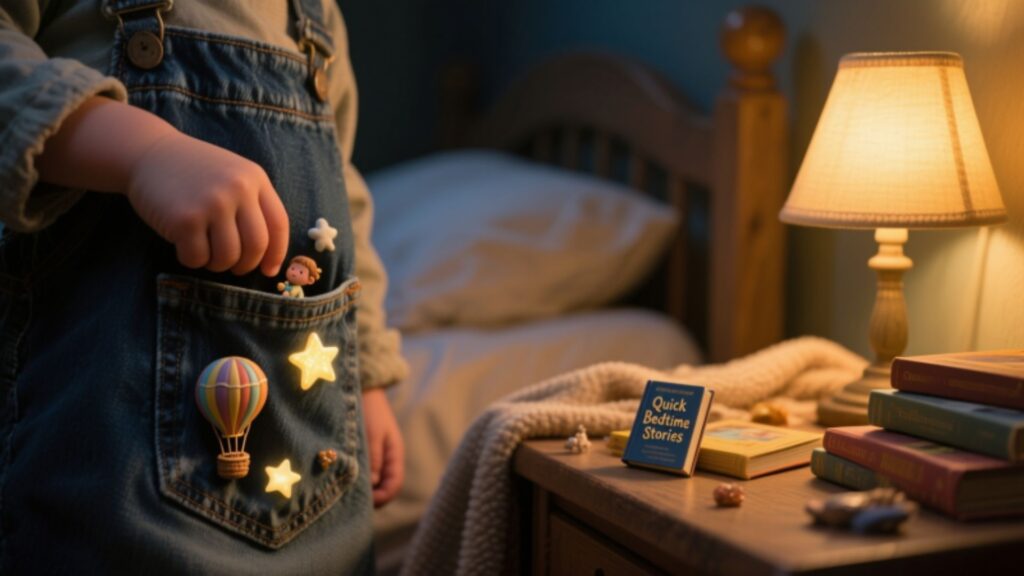
Tommy was the kind of kid who collected strange things.
Some kids collected stamps.
Some kids collected marbles.
Tommy collected… shadows.
It started one breezy evening when he was walking home from school. The sun was sinking low, and his shadow stretched long and skinny, almost like it wanted to run away. That’s when he noticed something odd.
A patch of darkness slipped away from the corner of a lamppost. It wriggled, like spilled ink come to life. Tommy bent down, curious. And before he even knew why, he cupped his hands, scooped it up—
—and the shadow didn’t slip through his fingers. It curled and wiggled and then—shloop!—vanished into his jacket pocket.
Tommy froze.
He patted his pocket.
It felt heavy.
“Heh,” he whispered, grinning. “Cool.”
That night, Tommy couldn’t stop thinking about it. At bedtime, when his mom turned off the light, the whole room grew dark—except for a small corner where the night seemed a little too dark. Like something was missing.
The next day, Tommy tried again. He spotted a shadow hiding under a swing at the playground. He caught it. Into his pocket it went. He caught one from beneath his teacher’s desk. Another from the school’s flagpole. By the end of the week, he had seven shadows tucked away in his jacket.
And something strange began happening.
The world looked… brighter. Too bright. The schoolyard at dusk wasn’t dusky anymore. Nights didn’t feel quite like night. Even the moon seemed weak, pale, as if it was losing a contest against the sun.
Tommy shrugged it off. “No big deal,” he told himself. “It’s just shadows. Who needs them, anyway?”
But then came the whispers.
The first time he heard them was in his room. A soft hiss, like paper tearing.
Let us out.
Tommy sat up in bed, heart thumping. “Wh-who said that?”
His pocket rustled. He quickly emptied it. Nothing but lint and a marble. The shadows didn’t tumble out.
The next night, the whisper returned. This time it was clearer.
You’re keeping us trapped. We belong outside.
Tommy covered his ears. “Nope. Nope. Not listening.”
But the shadows didn’t stop. They hissed during breakfast. They hissed at recess. They hissed during math class, drowning out fractions.
By the third night, they weren’t whispering anymore. They were chanting.
Release us. Release us. RELEASE US.
That Friday, Tommy had enough. He marched to the backyard under the full moon. “Fine! You want out? Then out you go!”
He yanked open his pocket.
Nothing happened.
He shook his jacket. Still nothing.
Then… movement. His shadow stretched strangely beneath him, bubbling and squirming. One by one, the shadows he’d collected slithered out—not onto the ground, but into the air. They swirled together into a thick cloud of darkness.
The night sky dimmed. The moon disappeared. It was like someone had painted the world with black ink.
And then… eyes opened in the dark. Dozens of glowing yellow eyes.
“You took us,” the shadows hissed, voices weaving together like a storm. “So now… we take you.”
Tommy’s heart nearly jumped out of his chest. “Wait, wait! I’m sorry! I didn’t mean to keep you! I thought you were just… cool!”
The shadows circled closer, cold and heavy. His breath frosted in the summer air.
“You belong in the light,” they whispered. “We belong in the dark.”
Tommy gulped. “Then… then take me to the dark. Just… don’t swallow me up!”
There was silence. The yellow eyes blinked. Then, slowly, the shadows retreated. They poured back into corners, slid under trees, curled beneath his sneakers. The sky brightened. The moon peeked out again.
Tommy collapsed onto the grass, gasping. His pockets felt light. Empty.
The whispers were gone.
From that night on, Tommy never collected shadows again. But sometimes, when the moon was especially bright, he swore his shadow shifted just a little too much.
And if you lean close enough—close enough to hear something you’re not supposed to—
You might catch it whispering.
Don’t keep what doesn’t belong to you.
End of Story.
The Firefly Nightlight
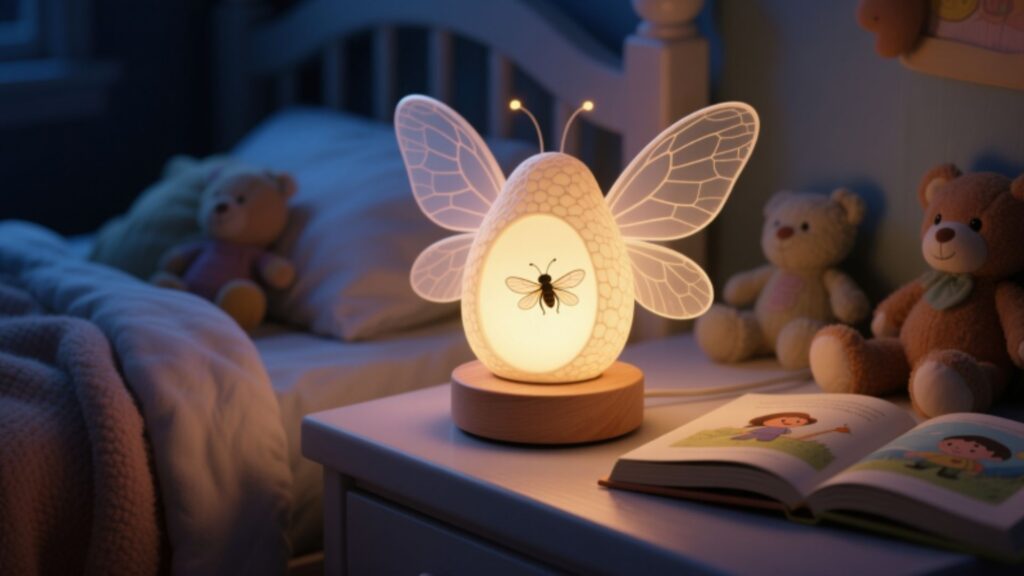
Nina hated the dark.
Not a little. Not sometimes. She really, really hated it.
Shadows in her room seemed to stretch like long fingers. Her closet whispered secrets she didn’t want to hear. Even the trees outside scratched at her window in a way that made her shiver.
Her mom always said, “It’s just your imagination, Nina.”
But that night, Nina knew it wasn’t.
The power went out. The whole neighborhood was dark. Streetlights blinked off. Fans stopped whirring. Even the fridge went quiet.
Nina hid under her blanket, clutching her stuffed rabbit. She tried to pretend she was safe. She tried to tell herself that monsters didn’t exist.
But that’s when she noticed it.
A tiny flicker at her window.
A firefly.
It blinked once. Then twice. Almost like it was calling her.
Curious, Nina slipped out of bed and padded across the wooden floor. Her slippers made soft squeak sounds on the old boards. The firefly hovered just outside the window, glowing like a lantern in the night.
It zipped inside, hovering midair, then floated toward her nightstand. Its light grew brighter with each beat of its tiny wings.
Before she could blink, it settled inside her small glass jar.
The firefly’s light filled the room like a little sun. The shadows vanished. Nina gasped.
“You’re… a nightlight!” she whispered.
Blink. Blink.
The firefly blinked in answer, like it was nodding.
That night, Nina stayed awake longer than she ever had before. She watched the firefly move in tiny loops inside the jar. Its glow pulsed softly, like a heartbeat.
It was magical.
She named it Twinkle.
Twinkle seemed to understand her fears. When Nina felt her heart thumping from the shadows in the corners, Twinkle’s light grew warmer, calmer. The room didn’t feel so scary anymore.
Night after night, Nina noticed something strange.
Twinkle blinked in patterns—three blinks, a pause, then one blink.
It was communicating!
Nina realized she could understand Twinkle in a way she didn’t understand anyone else.
You’re safe. You’re safe. You’re safe, the firefly seemed to say.
And somehow, she believed it.
The next week, the power flickered again. Nina was ready. She didn’t even hide under the blanket. Twinkle was glowing in the jar, brighter than ever.
But something else had changed.
The shadows moved. They didn’t disappear completely. They swirled softly along the walls, curling like smoke. It was almost like they were dancing… or waiting.
Nina shivered. “Don’t go near me,” she whispered to the shadows.
Twinkle blinked twice. Three. Then one.
I’ve got you, the firefly said.
And Nina believed it.
One night, the shadows seemed bolder.
They stretched across her floor, leaning toward the jar. Her heart hammered.
Nina held Twinkle tight. “You can’t take me,” she whispered.
Suddenly, a faint voice drifted from the shadows.
“You shouldn’t be awake.”
Her eyes widened. She wasn’t alone. Not really.
The firefly zipped in front of her like a little shield.
“I’m… I’m not afraid,” Nina said, though her voice wobbled.
The shadows didn’t move closer. They paused.
Twinkle’s glow grew warmer.
We protect you too, it blinked.
Nina realized something important. The shadows weren’t bad. They were just… lonely.
They moved when no one was looking. They whispered in corners. But Twinkle could keep them from scaring her.
She made a plan.
If she treated the shadows with respect, they wouldn’t hurt her. And Twinkle would keep her safe.
That week, Nina experimented.
She held Twinkle in one hand, and in the other, she reached out toward the shadows. Slowly. Gently.
“Hello,” she said.
Nothing happened.
Then, one shadow stretched forward, almost like a ribbon of smoke. Nina froze.
Twinkle blinked rapidly.
It’s okay, the firefly seemed to say.
The shadow curled gently around her arm. Warm. Not cold. Not scary. Just… soft.
Nina smiled. “Hi,” she whispered.
By the next night, the shadows and Nina had an unspoken truce.
Twinkle glowed brightly in the jar. The shadows swirled along the walls, making funny shapes that made Nina laugh. A dragon! A dancing giraffe! A giant smiling cat!
The darkness wasn’t scary anymore. It was playful.
Even the scratching trees outside didn’t bother her. She’d learned that not everything that moved in the dark wanted to hurt her.
But then something new happened.
One night, Twinkle’s light grew too bright.
The shadows froze. The edges of the room seemed sharper, colder.
And Nina noticed… movement outside the window.
A figure. Tall. Dark. Looming. Not human, not animal. Just… there. Watching.
Nina’s throat went dry.
Twinkle zipped out of the jar, glowing fiercely, circling around her.
“You protect me, right?” Nina whispered, clutching the jar.
Blink. Blink. Blink.
Yes. I protect you.
The figure outside shifted. Nina’s heart raced. She could hear the wind move through the leaves. A branch scraped the window.
Twinkle zipped straight at the glass. The figure froze. Then, slowly… it backed away into the darkness.
The next morning, Nina told her mom about the night.
“There was… something outside,” she said, voice trembling.
Her mom smiled kindly. “It’s probably just a tree branch, sweetie. The shadows play tricks in the dark.”
Nina didn’t argue. But she didn’t forget.
She knew Twinkle wasn’t just a firefly. Twinkle was a guardian.
That summer, Nina and Twinkle became inseparable.
She carried the jar everywhere. On family trips. To sleepovers. Even on quiet walks in the evening. Twinkle’s glow was steady. Calm. Brave.
And Nina learned something: courage wasn’t about never being scared. It was about having someone—or something—by your side when the shadows got too close.
One night, during a blackout, Nina decided to test her bravery.
She turned off the lamp. Covered herself with the blanket. And whispered to Twinkle, “Let’s see if I can sleep on my own.”
The shadows stretched across the walls, silent.
Twinkle floated above her bed, dim and gentle.
Nina closed her eyes.
And she slept.
When she woke, the sunlight spilled across her room. The shadows were gone. Twinkle hovered over the pillow, blinking softly.
“You did it,” the firefly blinked.
Nina smiled, hugging the jar. “We did it.”
From that night on, Nina never feared the dark again.
Even during thunderstorms. Even during power outages. Even when strange shapes moved in the corners.
Twinkle stayed with her, glowing softly in the jar. The shadows never bothered her. Sometimes they even played along, forming funny shapes on the walls that made her giggle before bed.
And sometimes, just before she fell asleep, she’d see Twinkle’s light flicker in patterns—almost like it was telling her, I’m always here. You’re safe.
Years later, Nina told her little brother about the firefly.
“Do you think it’s real?” he asked, wide-eyed.
Nina blinked at the glowing jar on the nightstand. Twinkle hovered inside, wings a blur.
“I don’t know,” she said with a smile. “But it feels real. And that’s enough.”
And as she closed her eyes, the firefly blinked one last time.
Goodnight, Nina.
✨ The End ✨
The Pajamas That Danced
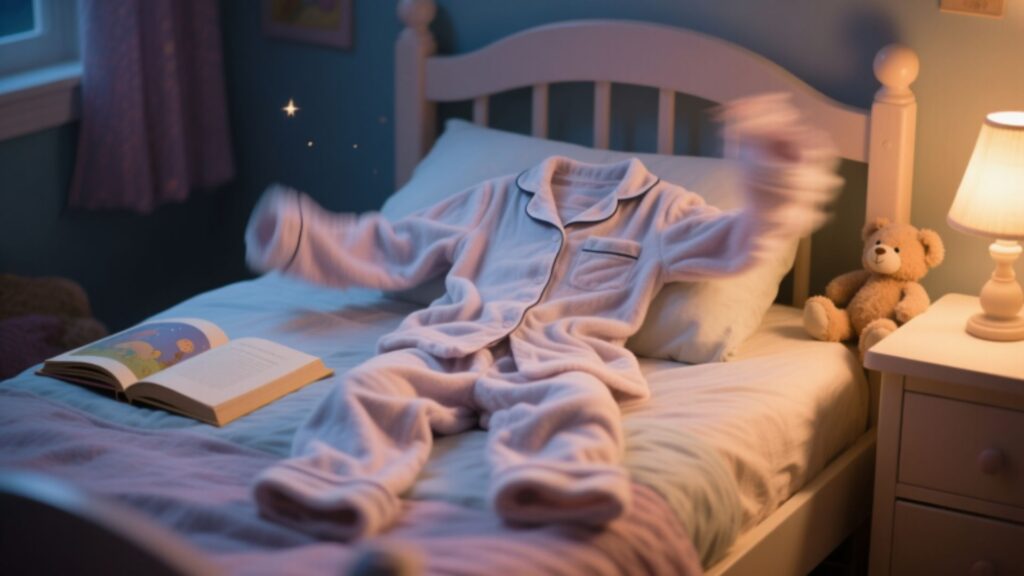
Maya had never liked bedtime.
The whole house seemed too quiet. Her toys looked like they were staring at her. The trees outside scratched at the windows with long, bony fingers. And her pajamas… well, they had always been strange.
They were old, handed down from her cousin. Blue with little silver stars stitched all over them. The fabric was soft, but when Maya wore them, she felt like the stars twinkled just a little too brightly in the dark.
One night, when the moon was high and glowing like a watchful eye, something happened.
The pajamas moved.
At first, Maya thought it was her imagination. She was lying in bed, her legs tucked under the blanket, when the fabric around her knees began to twitch. Not like scratching an itch. Not like shifting to get comfy.
No. The pajamas were wiggling.
She yanked her blanket off. “Stop it,” she whispered. But the stars twinkled brighter, and suddenly—her legs started to dance.
She hopped. She spun. She twirled across the room.
Her pajamas were dancing on their own.
Maya tried grabbing her knees, but her arms swung into the dance, too. She shuffled across the floor, tripped over her rug, and bumped into her closet door.
Wham!
The closet creaked open. And from the darkness inside came… music.
Not normal music. This was tinkly, eerie, like an old music box winding itself up.
The pajamas seemed to like it. They stomped and twirled toward the closet, dragging Maya along.
“No way! I’m not going in there!” she shouted, trying to pull back.
But the stars gleamed brighter. The pajamas dipped her like she was in some fancy ballroom. Then they yanked her forward, straight into the dark closet.
The music grew louder. The air smelled like dust and something sweet—like candy corn.
When Maya opened her eyes, she wasn’t in her closet anymore.
She was in a giant ballroom.
Hundreds of other kids were there, all wearing strange pajamas—striped, spotted, glowing, even ones that sparkled like fire. And every single pair was dancing on its own, twirling the children like puppets.
Maya gasped. “What is this place?”
A boy in polka-dot pajamas whirled past. “The Pajama Ball!” he shouted before spinning out of sight.
The Pajama Ball?
Maya’s pajamas twirled her into the middle of the room. The floor shone like polished glass. The chandeliers overhead flickered with candles that looked like floating fireflies.
And at the very center of it all stood a tall figure in a robe stitched with glowing stars. His voice echoed like the wind:
“Welcome, dancers! Tonight, your pajamas belong… to me!”
Maya gulped. Her legs jittered into a jig.
She tried fighting it, but her pajamas were too strong. She spun until she was dizzy. All around her, the other kids laughed nervously or cried out, unable to stop their pajama-dance.
“No!” Maya shouted. “I want to go home!”
The starry man raised a hand. “No one leaves the Pajama Ball until the music ends. Dance until the final note!”
The music box whirred louder. The pajamas jerked her into another twirl.
But then Maya noticed something.
The stars on her pajamas weren’t just twinkling anymore. They were blinking… like eyes. And they looked scared.
“Wait,” Maya whispered. “You don’t want to dance, do you?”
The fabric shivered.
That was it—the pajamas weren’t in charge. They were trapped, too.
Maya thought fast. If the pajamas were controlled by the music…
She clapped her hands over her ears. “La la la la la!” she yelled, trying to block it out.
The pajamas slowed. Just a little.
“YES!” Maya shouted. “Don’t listen! Don’t dance!”
The kids around her stared.
“Cover your ears!” Maya cried. “The music only works if we listen!”
One by one, the children clamped their hands over their ears. Their pajamas twitched, jerked… and then froze.
The ballroom went quiet.
The starry man’s face twisted in anger. “No! Keep dancing!”
But without the music, the pajamas went limp. The chandeliers flickered. The glassy floor cracked like ice.
And suddenly—
Crash!
The ballroom shattered into darkness.
Maya woke up on her bedroom floor, tangled in her starry pajamas.
Her closet was shut tight. No music. No ballroom.
Just silence.
She patted the fabric. “You okay?” she whispered.
The stars twinkled faintly. Not creepy anymore. Just… safe.
From that night on, Maya still wore her starry pajamas.
But whenever she felt them twitch, she’d whisper, “Not tonight. We’re free.”
And the pajamas would stay still.
Well… most of the time.
The Snail’s Midnight Song
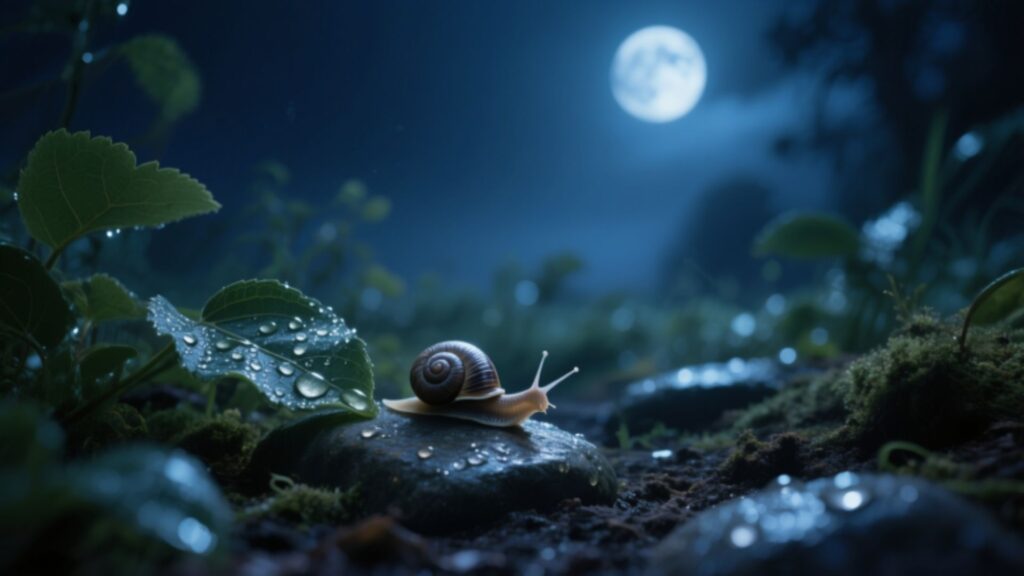
In a small village where the houses leaned close together and the cobblestones still remembered the sound of children’s laughter, there was a curious story the grown-ups never explained.
They said that if you stayed up very late, really late—long after the crickets had given up and the owls had grown tired—you could hear a song. Not from the trees. Not from the wind. But from the garden itself.
And some kids swore it came from a snail.
The Garden at Midnight
Lila was the kind of girl who noticed things. Tiny things. Like how the leaves on the old rose bush curled when the moonlight touched them. Or how ants always marched in the same direction at dusk.
So when her older brother teased her—“You believe in the singing snail, don’t you?”—Lila didn’t argue. She just thought, Why not?
That night, she couldn’t sleep. The moon was bright, spilling silver across her floorboards. She slipped on her slippers, tiptoed past her snoring dog, and opened the creaky back door.
The garden waited. Quiet. Still. Except… not quite.
She could hear something soft. A hum. Like someone humming with their lips closed, very low, almost hidden in the soil.
The Snail Appears
Near the strawberry patch, she saw it.
A snail. Its shell glistened like it had been polished with starlight. The patterns swirled in spirals, catching bits of moonshine. And as it slowly slid across the stones, the hum grew clearer—notes rising and falling, like a lullaby only the earth could understand.
Lila knelt down, holding her breath.
The snail… was singing.
Not words. Just a melody. Gentle, but strange. A little haunting. A little beautiful. Like the sound of a memory you can’t quite place.
The Song’s Secret
She followed the snail as it moved toward the fence, its song pulling her along. The notes weren’t random. They tugged at her chest, made her think of things she hadn’t thought about in a long time—her grandmother’s laugh, the way her mom used to hum while cooking, the squeak of her old rocking horse.
It was like the snail was gathering all the forgotten songs of the world and carrying them in its tiny body.
But then the song shifted. Darker. Sadder. A note that made the hairs on her arms rise.
The snail had stopped at a shadow near the fence. A place where the moonlight couldn’t reach.
And from that shadow, something stirred.
The Thing in the Dark
At first it looked like smoke. Then like a hand. Then like nothing Lila could name. It bent toward the snail, hungry.
The snail’s song grew louder, faster, filling the air like a shield. The shadow hissed, retreating with every note.
Lila realized—the snail wasn’t just singing. It was protecting.
Protecting the garden. Protecting her.
She crouched down, whispering, “Don’t stop.”
The snail’s shell glowed faintly, as though the stars themselves had come down to lend their light. The melody climbed, higher and higher, until the shadow finally melted back into the night.
The garden was quiet again.
The Promise
The snail turned, slowly, and for the tiniest second, Lila swore its feelers dipped like a bow.
She wanted to thank it, but her throat was tight. Instead, she whispered a promise: “I’ll remember your song.”
And then—so gently she could hardly believe it—the snail brushed past her hand. Warm. Like sunlight trapped in something small.
Moments later, it was gone. Just another snail in the garden.
Or maybe not.
The Next Morning
When Lila told her brother at breakfast, he laughed so hard he spilled his cereal.
“Sure,” he said. “The snail sang a song and saved the garden from monsters. Good one.”
But Lila didn’t argue. She just hummed softly to herself.
And though her brother didn’t notice, the dog’s ears twitched. The roses leaned toward her voice. And deep under the strawberry leaves, a tiny shell shimmered faintly in the daylight.
The snail’s midnight song wasn’t just a story anymore.
It was a secret. One she would carry forever.
The Clock That Skipped Midnight

In the little town of Marigold, where houses leaned close together like they were whispering secrets, stood a very old shop called Tick & Tock’s Timepieces.
The windows were dusty. The floorboards groaned when you stepped inside. And every single inch of the shop was filled with clocks.
Tall clocks. Pocket watches. Cuckoo clocks with birds that hadn’t flown out in years. Some ticked loudly. Some clicked softly. Some didn’t move at all.
But one clock stood apart.
It was a grandfather clock at the very back of the shop. Its wood was so dark it looked almost black.
Its face was silver, and the numbers shone faintly, even in the dark. No one knew where it came from. Not even old Mr. Tock, the shop’s owner.
“It just appeared one morning,” he told kids who asked. “And it never strikes midnight. Ever.”
The Dare
Of course, once kids heard that, it became the most whispered-about thing in town.
And one autumn night, when the moon was bright and pumpkins glowed on porches, three friends decided to test it.
Milo, the bravest.
Sophie, the curious.
And Theo, who was neither brave nor curious but refused to be left behind.
They slipped into Tick & Tock’s shop just before closing. Mr. Tock had gone upstairs to bed, leaving the clocks ticking and tocking in a hundred different rhythms.
The kids crouched near the grandfather clock and waited.
“Maybe it’s broken,” Theo whispered.
“Shhh,” Sophie hissed. “It’s almost midnight.”
The three of them held their breath as the hands crept closer.
11:57.
11:58.
11:59.
The ticking grew louder. Not just the grandfather clock—every clock in the shop. It was like they were all holding their breath, too.
Then—
The Skip
The minute hand trembled on 11:59. The three kids leaned in, eyes wide.
And then…
It skipped.
The hand jumped right over the number twelve, landing on 12:01.
The chimes that should have rung never came.
Instead, the shop went silent. Every clock stopped ticking at the same time.
The kids’ stomachs dropped. Even Theo, who had been hoping for nothing at all, whispered, “Uh-oh.”
That’s when the whispering began.
The Shadows
From the face of the grandfather clock, shapes began to stretch. Not numbers anymore. Not hands or gears. But thin, dark shadows that spilled across the floor like ink.
They curled around chair legs. They climbed up shelves.
And then—just like that—they spoke.
Not loudly. Just enough for the children to hear.
“You shouldn’t be here…”
Milo swallowed. “Who… who are you?”
“We are the lost minutes,” the shadows sighed. “The midnight hours that were skipped. The time that never was.”
Sophie’s eyes were wide, but her voice was steady. “Why doesn’t the clock strike midnight?”
The shadows swirled closer, brushing cold against their shoes.
“Because midnight is when we come out. Midnight is when the world listens. Midnight is when time bends.”
Theo squeaked, “I want to go home now.”
The Bargain
The shadows hissed around them, circling like wind. “You’ve seen too much. The rule is clear.
Those who watch the skip… must trade.”
“Trade what?” Milo asked, fists clenched.
“A minute,” the shadows whispered. “One minute from your life. We take it, and you forget this night.”
The three friends looked at each other.
Theo didn’t even hesitate. “Take it! Take a whole hour if you want!”
Sophie frowned. “What happens to the minutes you take?”
The shadows seemed to sigh. “We keep them. We become them. That is why we whisper. We are everyone’s lost time.”
Milo took a deep breath. “If we give you a minute, will you let us go?”
“Yes,” the shadows said together.
The Choice
The hands on the grandfather clock trembled again. 12:02. 12:03. The world outside still slept, but in the shop, it felt like time was stuck.
Sophie closed her eyes. “Fine. Take one of mine.”
The shadows swirled around her wrist, cold and light. And then, with a sound like a sigh, they slipped inside the clock.
The ticking started again. One by one, all the clocks came back to life.
Tick. Tock. Tick. Tock.
The grandfather clock’s hands moved forward, smooth as ever.
12:04.
The spell was broken.
The Morning After
The next morning, the three friends met at school.
Theo was pale. “Do you… remember what happened?”
“I do,” Milo said quietly.
“So do I,” Sophie admitted. “But it feels fuzzy. Like part of it’s already slipping away.”
And when they checked the clock on the wall, they all gasped.
Because the time read 12:03.
As if a single minute was missing forever.
The Secret
They never told anyone what happened. Not their parents. Not their teachers.
But sometimes, late at night, when Sophie was reading, or Milo was drifting off to sleep, or Theo was sneaking cookies from the kitchen, they’d hear it.
A faint whisper in the dark.
“Tick… tock… thank you for the minute.”
And they knew the shadows were still there.
Waiting for the next midnight.
The Moon’s Lullaby

Lila had always loved the moon.
She’d watch it from her window every night—big, silver, and glowing like a lantern in the sky. Sometimes it looked like a slice of bread. Other times, like a perfect ball of cheese. And sometimes, it looked like it was smiling.
But one night, something strange happened.
Instead of glowing softly, the moon looked brighter. Too bright. So bright that it lit up her entire room like daytime.
And then—Lila heard it.
A sound drifting down from the sky. A song.
Soft. Slow. Sweet.
Like a lullaby.
But the words… oh, the words didn’t sound right.
At first, it was gentle:
“Close your eyes… don’t make a peep…”
Then the melody changed.
“When you wake, you may not be…”
Lila froze. She pulled her blanket up to her chin.
“Did the moon just… sing to me?” she whispered.
The next morning, she asked her grandma at breakfast.
“Grandma, does the moon… ever sing?”
Her grandma chuckled. “The moon sings only in stories, dear. Did you dream it?”
Lila wanted to believe that. Really, she did.
But the tune still echoed in her head.
That night, Lila stayed awake on purpose. She wanted to know.
The moon rose higher. Silver spilled across her floor like water. And then—again—the lullaby began.
“Sleep now, child, drift away…”
“Don’t wake up till another day…”
But this time, Lila noticed something new.
The shadows in her room… were moving.
Her chair. Her bookshelf. Even her toy box. Their shadows were swaying side to side, like they were dancing to the moon’s lullaby.
Her heart thumped. She held her stuffed rabbit close.
“Stop it!” Lila squeaked.
The shadows froze.
For a moment, silence.
Then the moon’s song grew louder, sharper.
“You’ve heard me now, you can’t escape…”
Lila leapt out of bed and slammed the curtains shut.
The room went dark. The song faded.
Her heart slowed. Maybe she was safe.
But then…
Tap. Tap. Tap.
Something tapped on the window.
Lila’s hands shook as she pulled the curtain back just a sliver.
And there it was.
The moon. Enormous. Staring straight into her window.
And it was still singing.
“Child who listens, child who knows… follow me where no one goes…”
Lila stumbled back. “No. Nope. Not doing that.”
She grabbed a pillow and covered her ears. But somehow, the tune still snuck inside her head.
It was humming in her bones.
The shadows swayed again. The toy box creaked open. Her books rustled as though whispering.
Her stuffed rabbit slipped from her arms.
“No! Bunny!” she cried.
The rabbit’s shadow stretched… and then it walked toward the window.
“Come back!” Lila chased it. But before she could grab it, the rabbit-shadow pressed itself flat against the glass and—
Poof.
It vanished into the moonlight.
Lila gasped. “Oh no… it took him.”
She had two choices. Hide under her blanket and never sleep again. Or… follow the lullaby.
Lila tightened her fists. “I’m coming for you, Bunny.”
She pushed open the window. Moonlight spilled around her like silver dust. The song grew louder.
And then—before she could blink—she was lifted off her feet.
Floating.
Up.
Up.
Into the night sky.
The moon wasn’t smooth at all. Up close, it looked like a giant silver face. Its eyes were deep craters. Its smile stretched wide.
“Welcome, little dreamer,” it boomed.
Lila clutched the edge of her nightgown. “Where’s my rabbit? Give him back!”
The moon chuckled. “Ah, the toy. He wanted to dance in my lullaby forever.”
“No!” Lila stamped her foot in midair. “He’s mine. You can’t keep him.”
The moon tilted its glowing head. “Then you must sing back.”
Lila’s throat went dry. “Sing… back?”
“Yes. A lullaby of your own.”
The moon leaned closer, its craters forming a frown. “Or you will stay here, too.”
Her heart pounded. She had never sung in front of anyone but Bunny. But if she didn’t try… she’d never go home.
So she took a deep breath and sang:
“Moon so bright, let me be…
Bring my bunny back to me…
Shadows dance, but I will stay…
Please don’t take my dreams away…”
The moon blinked. Its glow flickered.
For the first time, the lullaby stopped.
And then—slowly—the moon smiled.
“You are braver than most, child.”
A beam of silver stretched out, and there was Bunny—falling right into her arms.
Lila hugged him tight. “We’re going home now.”
The moon’s voice rumbled one last time. “Sleep well, little dreamer. And remember… some songs are not meant to be heard.”
And just like that—Lila floated down, down, down.
Back into her bed.
Bunny was safe in her arms. The moon was quiet. The shadows still.
In the morning, Grandma peeked into her room. “Sleep well, dear?”
Lila smiled sleepily and nodded.
But under her pillow, she found something new.
A single silver feather.
Glowing faintly.
She tucked it away, hugging Bunny tighter.
Because she knew one thing for sure—
the moon still had lullabies left to sing.
✨ End of Story ✨
The First Goosebumps
Do you remember the first time a story gave you actual goosebumps? I do. I was maybe seven. A friend whispered some nonsense about a ghost that lived in the mango tree near our school.
Of course, I laughed. Said it was silly. But when I walked past that tree alone at dusk? Oh boy. My steps quickened. My palms went sweaty. And the back of my neck tingled like someone was breathing down it.
That’s the power of a spooky story. It takes something ordinary — a tree, a house, a toy — and twists it. Suddenly, the world feels charged. Different. Dangerous, even.
Kids love this shift because it makes life bigger than it looks. The mundane becomes magical.
Not Too Scary. Just Scary Enough.
There’s a delicate balance with spooky stories for kids. Too dark, and it’s trauma. Too light, and it’s boring. The sweet spot? A ghost in the attic. A whisper in the walls. A doll that might move when no one’s watching.
It’s about suggestion. A story doesn’t have to splatter blood or unleash demons to work. In fact, the less you explain, the scarier it feels. Kids fill in the gaps with their own imagination, and trust me, that’s a wild place.
Think about it: who hasn’t stared at the dark space under the bed and been absolutely certain something was crouched there? The story doesn’t need to tell you what. Your brain does the heavy lifting.
Why Do Kids Love Being Scared Anyway?
Here’s where parents often scratch their heads.
Why do my kids beg for spooky stories and then hide under the covers?
Why do they demand ghost tales at sleepovers and then keep the lights on?
Why do they play with fear like it’s a toy?
It’s because fear, in controlled doses, is thrilling. Kids are constantly testing boundaries: climbing too high, running too fast, sneaking into places they shouldn’t. Spooky stories are just another way to push limits without actual danger.
It’s like practicing bravery. Facing shadows in the story helps them face shadows in real life.
Stories as a Safe Playground for Fear
Think about it this way. Kids know the world is unpredictable. Adults forget that, but children sense it all the time. They know they’re small. They know they depend on bigger people to keep them safe. And sometimes, bigger people fail.
Spooky stories give kids a safe sandbox to play with those scary truths. A haunted house becomes a training ground. A ghost encounter becomes practice. They can gasp, scream, laugh, and walk away unharmed.
Fear becomes manageable. Tamed, even. And they carry that skill into real life — whether it’s handling a thunderstorm, speaking in front of class, or just walking into a dark hallway.
The Campfire Effect
Here’s another thing: spooky stories bring people together.
Picture it — a group of kids huddled around a flashlight or a campfire. One kid starts telling a ghost story. The others lean in. The shadows flicker. The silence between words stretches. And then—BOO! Everyone screams, and then they burst into laughter.
That shared shiver? It’s bonding. Spooky stories aren’t just entertainment. They’re social glue. They create collective memories.
Even adults remember those moments decades later. “Hey, remember that time you told us about the crying ghost in the bathroom and Jenna almost fainted?” The story lives on, not because of the ghost, but because of the people around the ghost.
Lessons Hiding in the Shadows
Let’s be real. Many spooky stories sneak in lessons. They’re moral tales in disguise.
The greedy kid who steals? Haunted by the treasure he grabbed.
The rude child who mocks others? Cursed until she learns kindness.
The curious one who ignores warnings? Learns respect the hard way.
See the pattern? These stories scare, yes, but they also guide. They whisper rules of life: listen, respect, be careful, be kind.
Kids may not consciously decode all that, but the message seeps in. Fear makes it sticky.
A Bridge Between Cultures
Here’s something I’ve noticed while traveling (or honestly, just chatting with friends from different places). Every culture has spooky stories for kids. Different ghosts. Different monsters. Same vibe.
In India, there are chudails — women with backward feet. In Japan, yokai with mischievous tricks. In Mexico, La Llorona, the weeping woman. In the West, headless horsemen and haunted mansions.
What does that tell us? Fear is universal. Kids everywhere crave these little jolts of terror. And stories — spooky ones especially — are a cultural handshake. They carry traditions, beliefs, and shared human fears across generations.
My Nephew’s First Ghost
Quick personal story here. My nephew, about eight years old, begged me for a ghost story one night. I hesitated. Didn’t want to ruin his sleep. But he insisted, “Please! Just a little one!”
So I spun something harmless about a ghost who only moved people’s socks around the house. Not scary. Just silly. He laughed, but later… he asked, “But what if it takes my socks tonight?”
He wasn’t trembling. He wasn’t crying. But he was thinking. His world had tilted a little. Ordinary socks suddenly carried mystery. That’s the magic. Spooky stories don’t just scare. They make kids see the world sideways.
Do Kids Outgrow It?
Yes and no. Kids might grow out of the simple “boo!” type stories. But do we ever really outgrow the thrill of spooky tales? Look at horror movies. Haunted house attractions. Murder mystery podcasts. Adults still chase the same chills — just with bigger stakes.
The seed planted in childhood grows into a lifelong appetite for mystery, suspense, and the occasional good scare.
How to Tell Them Right
Now, here’s where adults sometimes mess up.
They either tell stories too heavy — nightmare fuel — or too light, and kids roll their eyes. The trick? Know your audience. Read the room. Use sound. Use silence. Use pauses.
Let the kids imagine the scary parts instead of dumping every detail. A half-open door is scarier than a full-blown monster description. The brain fills the blanks. And nothing is scarier than your own imagination.
But Aren’t Spooky Stories Bad for Kids?
Some parents worry. Will ghost stories traumatize my child? Will they cause anxiety? Nightmares?
Honestly, it depends. Some kids are extra sensitive. Some need gentler tales. That’s fine. But for most, spooky stories are like wrestling — rough play, but within limits. They build resilience.
And let’s not forget: kids ask for these stories. They’re not passive victims here. They want them. They demand them. Which means they’re choosing to step into fear — and back out again. That’s powerful.
Why They Last
So why do these stories endure? Why do we keep passing them down?
Because they’re fun. Because they teach. Because they bond us. Because they scratch a primal itch. And because no matter how modern the world gets, kids will always look into the dark corner of the room and wonder… what if?
Final Thought
Spooky stories for kids aren’t just entertainment. They’re training wheels for fear. They’re memory-makers. They’re cultural threads.
They remind us that being scared is part of being alive — and that sometimes, it’s okay to giggle right after you scream.
So next time a kid tugs at your sleeve and whispers, “Tell me something spooky,” don’t say no. Lean in. Drop your voice. Let the silence stretch. And watch their eyes widen.
That’s where the magic lives.


